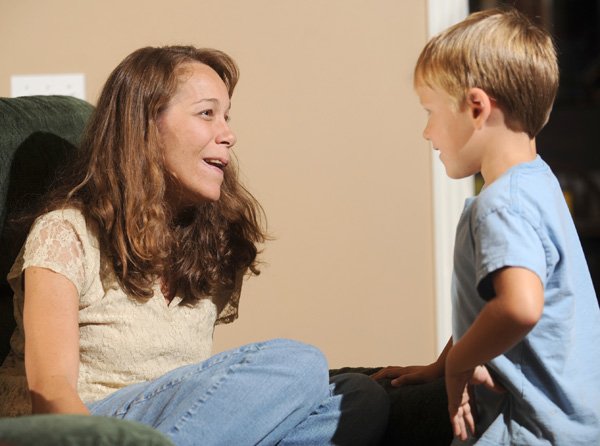FAYETTEVILLE — Julie Petty watched proudly Friday as President Barack Obama signed two bills into law, including legislation known as “Rosa’s Law” to remove phrases such as “mental retardation” from federal laws.
She shook hands with the president after the signing ceremony and had a brief conversation, according to her husband, Brian Petty.
It was her third trip to the White House this year.
Brian Petty, a videographer for the University of Arkansas, watched the proceedings on the White House website.
“It looked like they exchanged a few words,” he said Friday afternoon.
The president also signed the Twenty-first Century Communications and Video Accessibility Act of 2010 on Friday.
Rosa’s Law is named for a young girl from Maryland who has Down syndrome. The law is intended to strike the term “mentally retarded” from federal terminology.
Petty, who was born with cerebral palsy, calls it the “r” word. She knows firsthand the childhood pain of being called a “retard” and other degrading terms, such as “moron” or “imbecile.”
“The disability community considers ‘retard’ as hate language,” Petty said.
As an adult and advocate for people with intellectual and developmental disabilities, she wants to use Rosa’s Law as a platform to change Americans’ use of such words.
“I really want President Obama to know Rosa’s Law will change the terminology on paper, but we still have a lot of work to do,” she said Wednesday, surrounded by her two sons, husband, dog and cat.
They were glad to catch a few minutes with her as she had just returned from a trip to Washington, where she was working with disability groups planning a national summit. While she was in Washington earlier this week, she learned of the White House invitation to Friday’s ceremony.
Keeping to her original travel plans, she returned to Northwest Arkansas on Wednesday evening and returned to Washington on Friday morning.
The invitation from Friday’s event arose from a relationship Petty has forged with Tim Shriver, the executive director of Special Olympics, through her advocacy.
It was her relationship with Special Olympics that sparked her first visit to the White House earlier this year after the Rahm Emanual remark referring to certain liberals as “retards.” A group from Special Olympics visited with the former White House chief of staff to help him understand his ill-advised use of the word.
“We used it as a teachable moment,” Petty said. “He was the nicest guy.”
In July, Petty and her husband joined a contingent for a White House gala commemorating the 20th anniversary of the American Disability Act. The event marked the first time Petty shook hands with the president and was close enough to make eye contact.
Petty described herself as a person with a good sense of humor who likes to have fun.
Eric Treat, a colleague in the advocacy group, Arkansas People First, described Petty as the most awesome person he has known.
“She is a true voice for the disabled,” said Treat, who is the state president of Arkansas People First. “Her agenda is what is right for everyone.”
Petty credits Arkansas People First as a springboard of sorts, helping her break out of a shell.
“When I started with Arkansas People First I was totally different,” she said. “Then I met other people like me.”
That was 12 years ago, when she became a state director. The organization is in 48 states to promote self-advocacy for the disabled.
“I’ve learned it’s OK to ask for help,” she said. “I would ask for help and apologize. I’ve learned you don’t have to apologize. That changes your whole perspective.”
Petty said she hasn’t always been outgoing. In fact, she said, she would have thought someone crazy if they told them she would be an advocate for people with intellectual and development disabilities today. There was a time when she tended to stay in the background.
AT A GLANCE
Cerebral Palsy
The term cerebral palsy refers to any one of a number of neurological disorders that appear in infancy or early childhood and permanently affect body movement and muscle coordination but don’t worsen over time. Even though cerebral palsy affects muscle movement, it isn’t caused by problems in the muscles or nerves. It is caused by abnormalities in parts of the brain that control muscle movements.
Source: National Institute of Neurological Disease and Stroke, a division of the National Institutes of Health
She and Brian have been married nine years, and now have two sons — Logan, 7, and Warren, 5. The couple met in a mass communications class.
She earned a degree in journalism, served as the national chairman of the Self Advocates Becoming Empowered organization and learned to drive, thanks to Brian.
If she ever doubts her ability to advocate, she has only to review a letter she received not long ago from Sen. Mark Pryor, D-Ark., whom she encountered on a plane trip to Washington.
She mustered the courage to write a note to Pryor and present it to him while in the air and wouldn’t return to her seat until Pryor read the note asking him to support Rosa’s Law.
“I said, ‘Julie this is your opportunity to advocate,’” she said.

